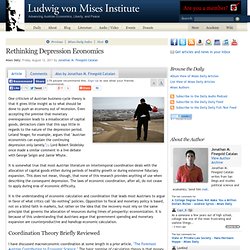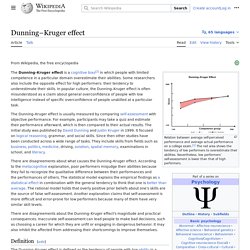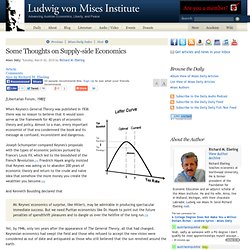

Rethinking Depression Economics - Jonathan M. Finegold Catalan. One criticism of Austrian business-cycle theory is that it gives little insight as to what should be done to push an economy out of recession.

Even accepting the premise that monetary overexpansion leads to a misallocation of capital goods, detractors claim that this says little in regards to the nature of the depression period. Leland Yeager, for example, argues that "Austrian economists can explain the continuing depression only lamely. "[1] Lord Robert Skidelsky once made a similar comment in a live debate with George Selgin and Jamie Whyte. It is somewhat true that most Austrian literature on intertemporal coordination deals with the allocation of capital goods either during periods of healthy growth or during extensive fiduciary expansion. It is the understanding of economic calculation and coordination that leads most Austrians to argue in favor of what critics call "do-nothing" policies. Coordination Theory Briefly Reviewed Depression Economics Interventionism and Its Consequences. Freakonomics. Rampant Unemployment = The Death Of The Middle Class - HiddenMysteries.
40 Facts That Prove The Working Class Is Being Systematically Wiped Out Without an abundance of good jobs, the middle class in the United States is going to shrivel up and die.

Right now, rampant unemployment is absolutely killing communities all over America. Hopelessness and poverty are exploding and many are now wondering if we are actually witnessing the slow death of the middle class. There simply are not nearly enough "good jobs" to go around anymore, and even many in the mainstream media are referring to this as a "long-term structural problem" with the economy. The only thing that most working class Americans have to offer in the marketplace is their labor. So the rich don't really have that much use for the working class in America anymore. So the fact that we are facing rampant unemployment that never seems to go away should not be a surprise to anyone. Well, guess what? Things are going to get a whole lot worse. More job cuts are coming. Needless to say, things don't look good. Free Statistics - Free Statistical Software.
John Gerzema: The post-crisis consumer. Google Image Result for. Ludwig von Mises Institute. Money and Politics By far the most secret and least accountable operation of the federal government is not, as one might expect, the CIA, DIA, or some other super-secret intelligence agency.

The CIA and other intelligence operations are under control of the Congress. They are accountable: a Congressional committee supervises these operations, controls their budgets, and is informed of their covert activities. It is true that the committee hearings and activities are closed to the public; but at least the people's representatives in Congress insure some accountability for these secret agencies.
It is little known, however, that there is a federal agency that tops the others in secrecy by a country mile. Thus, when the first Democratic president in over a decade was inaugurated in 1993, the maverick and venerable Democratic Chairman of the House Banking Committee, Texan Henry B. It was to be expected that Fed Chairman Alan Greenspan would strongly resist any such proposals. 1. Dunning–Kruger effect. Cognitive bias about one's own skill The Dunning–Kruger effect is a hypothetical cognitive bias stating that people with low ability at a task overestimate their own ability, and that people with high ability at a task underestimate their own ability.

As described by social psychologists David Dunning and Justin Kruger, the bias results from an internal illusion in people of low ability and from an external misperception in people of high ability; that is, "the miscalibration of the incompetent stems from an error about the self, whereas the miscalibration of the highly competent stems from an error about others".[1] It is related to the cognitive bias of illusory superiority and comes from people's inability to recognize their lack of ability. Without the self-awareness of metacognition, people cannot objectively evaluate their level of competence. Original study[edit] Later studies[edit] Mathematical critique[edit] Paired measures[edit] Cultural differences in self-perception[edit]
Some Thoughts on Supply-side Economics - Richard M. Ebeling. [Libertarian Forum, 1980] When Keynes's General Theory was published in 1936 there was no reason to believe that it would soon serve as the framework for 40 years of economic theory and policy.

Almost to a man, every important economist of that era condemned the book and its message as confused, inconsistent and dangerous. Joseph Schumpeter compared Keynes's proposals with the types of economic policies pursued by France's Louis XV, which led to the bloodshed of the French Revolution.[1] Friedrich Hayek angrily insisted that Keynes was asking us to abandon 200 years of economic theory and return to the crude and naive idea that somehow the more money you create the wealthier you become.[2] And Kenneth Boulding declared that Mr. Yet, by 1946, only ten years after the appearance of The General Theory, all that had changed.
Paul Samuelson could prayerfully give thanks that Keynesian system had given economists, "a Gospel, a Scripture, a Prophet How successfully has this truth been learned?